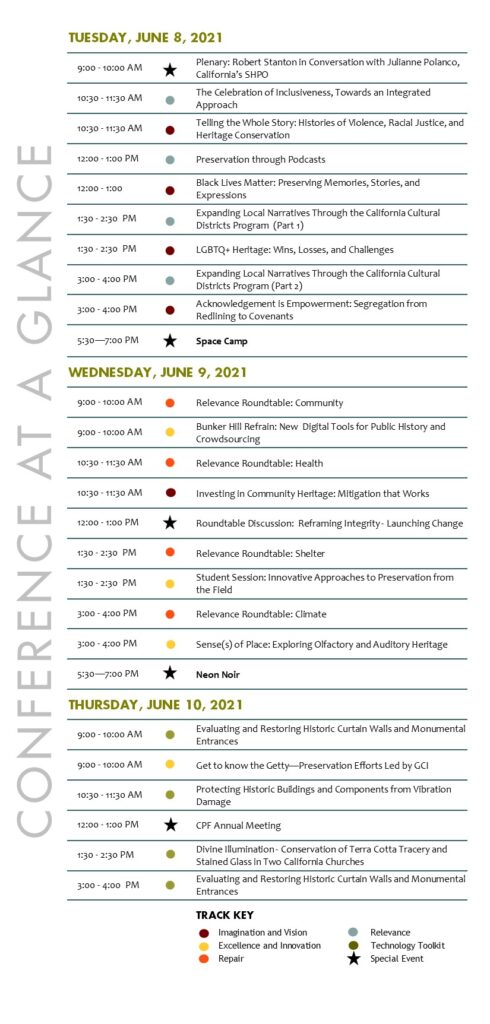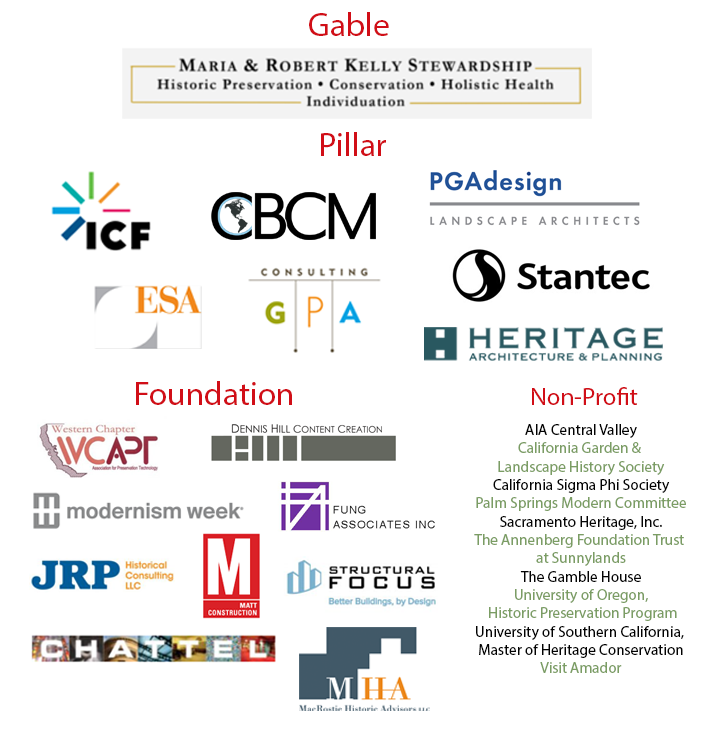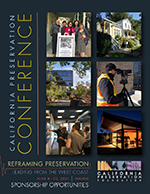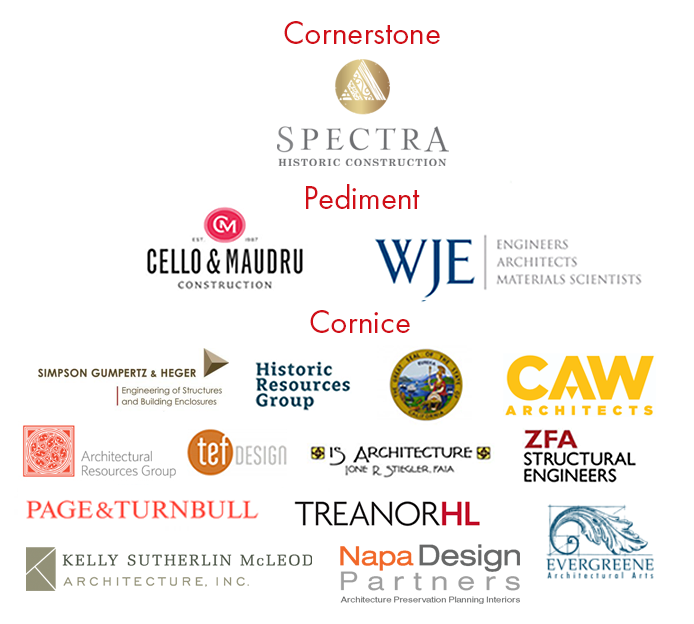Registration & Details
Details
- $175 Non-members Full Conference. Includes one year of Individual Membership ($50)
- $150 Members Full Conference
- $75 per day for Day 1 and Day 2
- $95 per day for Day 3 (Professional Training Day)
- $250.00 Civic Engagement Package – 10 Tickets + 8-Month Membership (ideal for local governments and nonprofits)
- Students FREE | Speakers FREE
Continuing education
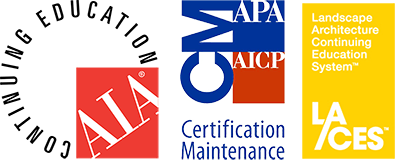 All live programs qualify for continuing education units through the AIA, AICP, ASLA and CLG. All attendees can take advantage of our continuing education program at no additional cost.
All live programs qualify for continuing education units through the AIA, AICP, ASLA and CLG. All attendees can take advantage of our continuing education program at no additional cost.
- Many sessions qualify for Health, Safety, and Welfare units (HSW)
- Some sessions will qualify for AICP legal and ethics credits
Register securely online through CPF’s Website:
For More Information
- Call us at 415-495-0349
- Email at cpf@californiapreservation.org
Track Titles
With our online format we have an unprecedented opportunity to expand our programs and address the enormous issues facing heritage conservation in California and beyond. To do so, the focus of the conference programs will be based on a set of values that broadly define the challenges before us as preservationists:
-
- Excellence & Innovation. Overcoming technical challenges using the latest and best practices in preservation.
-
- Using tools and other knowledge to complete challenging projects.
- Harnessing the power of new technology
- Ensuring that preservation keeps abreast of new knowledge and discoveries
-
- Imagination & Vision. Using creativity and gumption to move preservation in new directions.
-
- Creative solutions to difficult preservation challenges
- Coalition building
- Storytelling
- Thinking outside of the preservation box
- Intersecting with other disciplines and finding common ground and common solutions.
-
- Relevance. How can heritage conservation improve the quality of life? Sessions within this field will demonstrate and discuss preservation’s role in some of the following challenges of the 21st Century:
-
- Housing
- Environmental Justice
- Immigration
- Health
- Education
- Jobs
-
- Repair. How do we address the process and result of erasure and painful moments in history?
-
- Helping communities that have lacked preservation programs
- Making “history right”
- Addressing conflict and mistrust
- Telling the untold
-
- Technology Toolkit. Professional training webinars to get you ahead in current research and design methodologies.
- Excellence & Innovation. Overcoming technical challenges using the latest and best practices in preservation.
Keynote Address
This year’s keynote address will include special programming on Tuesday morning at 9 AM in conversation with Robert G. Stanton, our nation’s first African American Director of the National Park Service. Julianne Polanco, the State Historic Preservation Officer (SHPO) for California will moderate this enlightening discussion with Mr. Stanton.
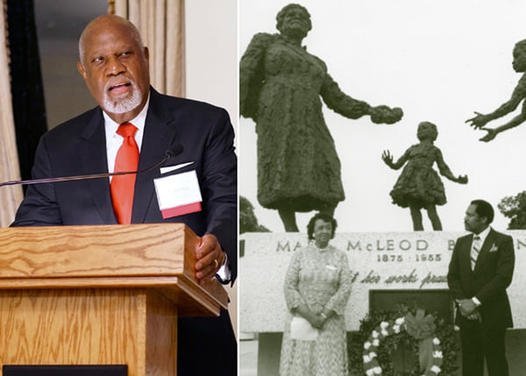 Robert G. Stanton, was born on September 22, 1940 in Fort Worth, Texas. His mother was a short order cook and his father was a hay contractor. He grew up in Mosier Valley, one of the oldest communities in Texas, founded by African Americans shortly after the U.S. Civil War. He graduated from l.M. Terrell High School in Fort Worth in 1959.
Robert G. Stanton, was born on September 22, 1940 in Fort Worth, Texas. His mother was a short order cook and his father was a hay contractor. He grew up in Mosier Valley, one of the oldest communities in Texas, founded by African Americans shortly after the U.S. Civil War. He graduated from l.M. Terrell High School in Fort Worth in 1959.
.
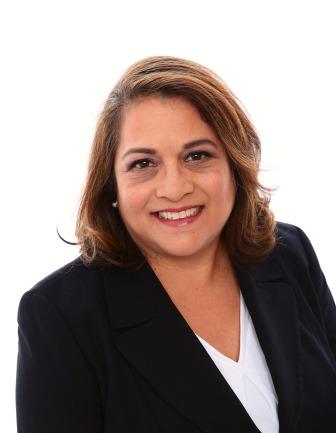 Julianne Polanco, Juli Polanco was appointed as the State Historic Preservation Officer in 2015. She served as Commissioner and Chair of the California State Historical Resources Commission from 2005 to 2015. She was the Director of Cultural Resources for Lend Lease Americas, the Acting Federal Preservation Officer for the Presidio Trust, and Assistant to the Vice President for programs at the World Monuments Fund. Ms. Polanco also held several positions within California State Government including Advisor to the Chairman of California Integrated Waste Management Board and Special Assistant to the Secretary of the California Environmental Protection Agency. During her tenure at the California Department of Conservation, she advised the Director on Recycling, Mines and Geology, and environmental legislation. She was a district representative to Congressman Robert T. Matsui, specializing in labor, health care, the military, veterans’ affairs and the environment. She has served on the boards of the California Preservation Foundation, Latinos in Heritage Conservation, and San Francisco Heritage. She is a founding member and current Co-Chair of the Climate Heritage Network. Juli holds a Bachelor’s of Science in Political Science/International Relations from the University of California at Santa Barbara and a Master’s of Science in Historic Preservation from Columbia University.
Julianne Polanco, Juli Polanco was appointed as the State Historic Preservation Officer in 2015. She served as Commissioner and Chair of the California State Historical Resources Commission from 2005 to 2015. She was the Director of Cultural Resources for Lend Lease Americas, the Acting Federal Preservation Officer for the Presidio Trust, and Assistant to the Vice President for programs at the World Monuments Fund. Ms. Polanco also held several positions within California State Government including Advisor to the Chairman of California Integrated Waste Management Board and Special Assistant to the Secretary of the California Environmental Protection Agency. During her tenure at the California Department of Conservation, she advised the Director on Recycling, Mines and Geology, and environmental legislation. She was a district representative to Congressman Robert T. Matsui, specializing in labor, health care, the military, veterans’ affairs and the environment. She has served on the boards of the California Preservation Foundation, Latinos in Heritage Conservation, and San Francisco Heritage. She is a founding member and current Co-Chair of the Climate Heritage Network. Juli holds a Bachelor’s of Science in Political Science/International Relations from the University of California at Santa Barbara and a Master’s of Science in Historic Preservation from Columbia University.
This presentation is included in your conference registration. We are also offering this webinar free to the general public with registration here.
Tuesday, June 8, 2021 - Online Programs
Track: Special
Tuesday, 06/08/2021, 9:00 AM – 10:00 AM
Keynote Session: Julianne Polanco in Conversation with Robert G. Stanton
This year’s keynote address will include special programming on Tuesday morning at 9 AM in conversation with Robert G. Stanton, our nation’s first African American Director of the National Park Service.
Moderator
Julianne Polanco, State Historic Preservation Officer, California Office of Historic Preservation
Speakers
Robert Stanton, Director (retired), National Park Service
—————————————————————————————–
Track: Repair
Tuesday, 06/08/2021, 10:30 AM – 11:30 AM
Telling the Whole Story: Histories of Violence, Racial Justice, and Heritage Conservation
Californians inherit fraught histories of racial violence, state suppression, and civil unrest. This roundtable brings together practitioners and scholars to discuss how to confront places and stories associated with colonization, racism, and movements for racial justice. How does heritage conservation advance repair in BIPOC communities, and what roles do demolition and other forms of erasure play in how communities remember? In the absence of built heritage, what are the intangible ways that Californians memorialize, reckon with, and share knowledge about histories of violence and struggle? And how do we make room for joy and creation in these spaces?
Moderator
Laura Dominguez, Ph.D. Candidate, University of Southern California, Department of History
Speakers
Carson Anderson, Senior Historic Preservation Planner, City of Sacramento
Jackson Loop, Policy Coordinator, Southern California Association of Nonprofit Housing
Desiree Renee Martinez, MA, RPA, Tongva (Gabrielino), President, Cogstone Resource Management
Rosalind Sagara, Chair, Save Our Chinatown Committee
—————————————————————————————–
Track: Imagination & Vision
Tuesday, 06/08/2021, 10:30 AM – 11:30 AM
The Celebration of Inclusiveness Towards an Integrated Approach
Heritage professionals and community advocates in California have pioneered approaches in historic preservation by engaging socially diverse groups who have contributed vitally to the state’s cultural history. Intangible cultural heritage can only be heritage when it is recognized as such by the communities, groups or individuals that create, maintain and transmit it. In this track, participants will learn more about inclusive-oriented preservation and how preservationists work with communities to expand the boundaries of their practice.
Moderator
Milford Wayne Donaldson
Speakers
Reno Franklin
Luis Hoyos, Architect, State Historical Resources Commissioner,
Alison Rose Jefferson, Historian and Heritage Conservation consultant,
Christine Kehoe, Former CA State Senator and previous CA State Assembly,
Michelle Magalong , Executive Director, Asian & Pacific Islander Americans in Historic Preservation
—————————————————————————————–
Track: Repair
Tuesday, 06/08/2021, 12:00 PM – 1:00 PM
Black Lives Matter: Preserving Memories, Stories, and Expressions
In June 2020, thousands of Californians took to the streets in protest over the murder of George Floyd in Minneapolis. The Black Lives Matter-led movement created a multitude of spontaneous monuments and murals. These physical memorializations should be preserved, but the historic preservation field does not have well-established language, methodologies, or tools for conserving these kinds of stories and resources in real time. How are Black artists and communities preserving, interpreting, and sharing stories about the BLM movement in California? What roles might historic preservation professionals play in supporting or amplifying those efforts? And how is this work changing narratives about community, resistance, and structures of oppression in California and the U.S. at large?
Moderator
Karen Mack, CEO, LA Commons
Speakers
Mizan Alkebulan-Abakah, MPH, Co-Creator and Executive Director, Spearitwurx
De’Ana Brownfield, Arts & Culture Coordinator, Black Cultural Zone
K. Kennedy Whiters, Architect, Owner + Principal of kennedy Whiters + Associates, LLC, Founder of Black in Historic Preservation, unRedact the Facts, and Beyond Integrity in (X).
Karen Mack, CEO, LA Commons
—————————————————————————————–
Track: Imagination & Vision
Tuesday, 06/08/2021, 12:00 PM – 1:00 PM
Preservation through Podcasts
Podcasts have the ability to delve into an array of topics that can inspire imagination and vision for the preservation, heritage conservation, and architecture fields. They provide a platform that can help us as professionals in these fields to communicate the work that we do to a broad audience. Join three hosts of preservation podcasts as they detail some of the salient issues they have addressed, why they chose podcasts as a platform to share their work, and some of the logistics behind this technology.
Moderator
Kristen Hayashi, Collections Manager, Japanese American National Museum
Speakers
Catherine Meng, host, Design Voice podcast
Liam O’Donoghue, Host/Producer, East Bay Yesterday Podcast
Cindy Olnick, host, Save As podcast
—————————————————————————————–
Track: Imagination & Vision
Tuesday, 06/08/2021, 1:30 PM – 4:00 PM
Expanding Local Narratives Through the California Cultural Districts Program
The California cultural districts program was founded to highlight communities with high concentrations of cultural resources and activities. Through the passing of AB 189 in 2016 and subsequent action by the California Arts Council, 14 pilot cultural districts were designated in 2017. The districts represent a wide-range of locations and communities throughout California and each district has a unique history and sense of place. In 2020, the program was set to receive its first funding from the State budget to build the capacity of the designated districts, but this funding was postponed due to shifting priorities during the COVID-19 pandemic. What’s next for these communities as they attempt to keep forward momentum in celebrating their cultural resources, questioning outdated historical narratives, and building community through arts and cultural programming? What can we learn from the steps already taken and the priorities identified by the districts for the future? Stakeholders and organizers from a selection of the pilot cultural districts could discuss what the designation means for their communities, how they would like to see the program move forward, and what lessons they learned through the designation process that may apply to other communities in California and beyond.
Moderator
Eliza Tudor, Executive Director, Nevada City Arts Council, Grass Valley-Nevada City and Truckee Cultural Districts
Speakers
Shelly Covert, Spokesperson, Executive Director, Board Member, musician, Nevada City Rancheria Nisenan Tribal Spokesperson, Executive Director of the California Heritage: Indigenous Research Project, Board Member of the Nevada County Arts Council
Raquel Redondiez, SoMa Pilipinas Cultural District
Julia Sabory, Cultural Districts Manager, San Francisco Mayor’s Office of Housing and Community Development
—————————————————————————————–
Track: Repair
Tuesday, 06/08/2021, 1:30 PM – 2:30 PM
LGBTQ+ Heritage: Wins, Losses, and Challenges
From San Diego and Los Angeles to San Francisco, LGBTQ+ history is increasingly being told and better understood through place-based approaches, but how do we go further by protecting these places and making the full stories known and visible for all to see? San Francisco’s 2016 adoption of its LGBTQ Historic Context Statement served as a critical milestone and challenged traditional interpretation of integrity standards. Now after five years let’s check back in to see how advocates are working to save the threatened home of pioneering lesbian rights activists Del Martin and Phyllis Lyon, and the latest with South of Market’s world renowned Leather District and Compton’s Transgender District.
Moderator
Alex Westhoff, Senior Planner, City of San Francisco
Speakers
Alex Westhoff, Senior Planner, City of San Francisco
Shayne Watson, Consultant, Watson Heritage Consulting
Honey Mahogany, Co-Founder, The Transgender District
—————————————————————————————–
Track: Repair
Tuesday, 06/08/2021, 3:00 PM – 4:00 PM
Acknowledgement is Empowerment: Segregation from Redlining to Covenants
Redlining and racial covenants are two of the most prevalent racist practices used in the early-to-mid twentieth century to discriminate against and segregate communities of color. California was not immune to this nationwide display of racism, and only now are we beginning to fully understand this part of our past and reckon with its lasting legacy. Where do we start? Fully acknowledging this painful history and the people who incurred the harm is one way, to ensure a truthful understanding of how our communities developed over time, and why some parts remain segregated still today. Session participants will discover a range of tools such as historic context statements focused on race and suburbanization, interactive mapping, storytelling, and oral histories that produce tangible outcomes, tell this story, and begin to bring people together.
Moderator
Adrian Scott Fine (+ Sian Winship), Senior Director of Advocacy, Los Angeles Conservancy
Speakers
Sian [Co-Moderator] Winship, Preservation Consultant,
Sarah Jane Shoenfeld, Historian, Mapping Segregation in Washington DC
Sara C. Bronin, Thomas F. Gallivan Chair in Real Property Law and Faculty Director, Center for Energy and Environmental Law, University of Connecticut, School of Law
—————————————————————————————–
Track: Special
Tuesday, 06/08/2021, 5:30 PM – 7:00 PM
Space Camp: The Space Race and Traditional Cultural Properties
Rocket nerds come one and all to this special evening program looking at California’s most intact and largest rocket testing facility in the mountains of Southern California. This site received one of the most extensive HAER documentation efforts in history, including a complete laser scan of massive rocket testing stands, virtual tours and panoramas, and a full large format photography survey.
But the site also contains a history buried by the space race, another – completely different – historic place. This fast-paced look at the space race will also include those whose lands were erased – the Chumash, Gabrieleno, and Fernandeno tribes who are reclaiming their ancestral lands through a National Register nomination. Don’t miss this evening look at a controversial historic landscape associated with many uses.
Speakers
Thomas Behrens, Architect, Historic American Engineering Record
Jet Lowe, HAER Photographer (retired), National Park Service
Tribal representatives to be announced.
Wednesday, June 9, 2021 - Online Programs
Track: Relevance
Wednesday, 06/09/2021, 9:00 AM – 10:00 AM
Relevance Roundtable: Community
Join us for a dialog on how heritage conservation is relevant through the lens of community. How do we talk about our work in a way that connects with people from all walks of life? Folks from a variety of perspectives (community, climate, and shelter) will talk with each other, and you, about the challenges of communicating our relevance, from deep-seated myths to valid concerns. No Powerpoints or formal presentations, just a conversation to start shifting the narrative to reflect the impact – and the promise – of preservation on our communities.
Moderator
Cindy Olnick, Cindy Olnick Communications
Speakers
Donna Graves, Public Historian
Louisa Van Leer, Principal, Louisa Van Leer Architecture
Dillon Delvo, Executive Director, Little Manila
—————————————————————————————–
Track: Excellence & Innovation
Wednesday, 06/09/2021, 9:00 AM – 10:00 AM
Bunker Hill Refrain: New Digital Tools for Public History and Crowdsourcing
Bunker Hill in downtown Los Angeles was once home to a vibrant residential community. The Bunker Hill Refrain project examines a USC archive collection of household survey cards compiled by the WPA in 1939 that provide a snapshot of this racially and ethnically diverse neighborhood prior to its erasure through urban renewal. Through the use of crowdsourced cataloguing, the archive is being mined for content and analysis has begun, transforming this hidden archival resource into accessible data for understanding the evolution of this place.
Moderator
Trudi Sandmeier, Director of Heritage Conservation Programs, University of Southern California
Speakers
Meredith Drake Reitan, Associate Dean, Graduate School Office of the Provost, University of Southern California
Suzanne Noruschat, University of Southern California
Brannon Smithwick, University of Southern California
Jessica Rivas-Acuna, University of Southern California
Andrzej Rutkowski, University of Southern California
—————————————————————————————–
Track: Relevance
Wednesday, 06/09/2021, 10:30 AM – 11:30 AM
Relevance Roundtable: Health
Relevance was a major issue for our field before the world changed; now, in the wake of Covid-19, it’s even more so. How do we connect the work we do in preservation to issues of health and environmental justice (lead paint/pollution, clean water, etc.)? What do we do with aging health infrastructure? How do historic places impact our well-being? What lessons can we learn (again) about healthy living? Folks from a variety of perspectives (community, climate, and shelter) will talk with each other, and you, about the challenges of communicating our relevance, from deep-seated myths to valid concerns. No Powerpoints or formal presentations, just a conversation to start shifting the narrative to reflect the impact – and the promise – of preservation on our health.
Moderator
Christina Dikas, Associate Principal | Senior Architectural Historian, Page & Turnbull
Speakers
Geeti Silwal, Principal, Urban Design, Perkins & Will
Eric Haas, Principal, DSH // architecture
Rosalind Sagara, Neighborhood Outreach Manager, Los Angeles Conservancy
—————————————————————————————–
Track: Imagination & Vision
Wednesday, 06/09/2021, 10:30 AM – 11:30 AM
Investing in Community Heritage: Mitigation that Works
Mitigation measures for demolition projects are traditionally focused on architectural documentation in the form of expensive archival photography and a history report, or a set of interpretive displays. But how do we document a property that is important for intangible reasons–for the local events that occur there, for the community members who made their mark there, or for being a beloved community touchstone? What’s being lost is the connection that a community feels with its shared heritage. Are photos or interpretive panels the best we can do to mitigate for that loss? This session is the beginning of a conversation on how to advance our thinking in how we compensate for the loss of community assets. The City of San Antonio levies a fee by square-foot when a significant property is demolished. The City of San Francisco recently approved several community-led mitigation measures for its Better Market Street project. On other fronts, the City of San Francisco is working to develop mitigation standards that integrate diversity, equity, and inclusion objectives, and one federal agency has established a mitigation fund for impacts to tribal landscapes. This session explores the ways in which we might look at mitigating the loss of historic resources as an opportunity to invest in the preservation of community heritage.
Moderator
Susan Lassell, Senior Managing Director, Historic Preservation, ICF
Speakers
Gretchen Hilyard Boyce, Senior Manager/Historic Preservation Specialist, ICF
Allison Vanderslice, CEQA Cultural Resources Team Manager, Environmental Planning Division, San Francisco Planning
—————————————————————————————–
Track: Excellence & Innovation
Wednesday, 06/09/2021, 12:00 PM – 1:00 PM
Reframing Integrity – Launching the Revolution
While most landmark programs consider both architectural and cultural landmarks, the evaluation of integrity is often weaponized to prevent the recognition of non-architecturally significant sites. As a result, only a small number of culturally significant sites have been designated at the federal, state, or local levels. Grab your lunch and join this lively roundtable discussion examining integrity from a variety of perspectives. This talk will also serve as the launch of a new CPF initiative to formulate practical integrity guidance for advocates and local governments.
Moderator
Adrian Scott Fine, Senior Director of Advocacy, Los Angeles Conservancy
Speakers
Christine Lazzaretto, Principal, Historic Resources Group
Catherine Fleming Bruce, Author and Founder, TNOVSA Global Commons
Ray Rast, Associate Professor of History, Gonzaga University
—————————————————————————————–
Track: Special
Wednesday, 06/09/2021, 1:30 PM – 2:30 PM
Learning from the Future: Students Share Knowledge
Graduate student research in heritage conservation, public history, historic preservation, and related fields exemplifies excellence and innovation. Join us as these California students share their current scholarship.
This year’s presenters include:
Seda Aydin (California State Polytechnic University, Pomona) – An Architecture of in Between: A Mixed-use Artist Complex for Santa Barbara’s Funk Zone
Tejpaul Bainiwal (University of California, Riverside) – Starting a Movement: Sikh American Historic Preservation
Lindsay Mulcahy (University of Southern California) – Preservation on ‘the Natch’: Maintenance and Remembrance at the Alcoholism Center for Women
Moderator
Trudi Sandmeier, Director of Heritage Conservation Programs, University of Southern California
Speakers
Seda Aydin, Cal Poly Pomona
Tejpaul Bainiwal, University of California at Riverside
Lindsay Mulcahy, University of Southern California
—————————————————————————————–
Track: Relevance
Wednesday, 06/09/2021, 1:30 PM – 2:30 PM
Relevance Roundtable: Shelter
Join us for a conversation on the ways in which heritage conservation is relevant to our basic need for shelter. Through the lens of increasing homelessness, lack of affordability, climate change, and impending population growth, how can preservation refine its approach to balance traditional practices with new, proactive solutions to address these pressing human needs? Folks from a variety of perspectives (community, climate, and housing) will talk with each other, and you, about the challenges of communicating our relevance, from deep-seated myths to valid concerns. No Powerpoints or formal presentations, just a conversation to start shifting the narrative to reflect the impact – and the promise – of preservation to enact positive change for our basic need for shelter.
Moderator
Christine Lazzaretto, Managing Principal, Historic Resources Group
Speakers
Peter Rindelaub, Projects Director, Architect, Omgivning
Ken Bernstein, Principal City Planner, City of Los Angeles
Leslie Palaroan, Senior Project Manager, Satellite Affordable Housing Associates
—————————————————————————————–
Track: Excellence & Innovation
Wednesday, 06/09/2021, 3:00 PM – 4:00 PM
Sense(s) of Place: Exploring Olfactory and Auditory Heritage
What does a historic place sound like? Does it have a distinctive smell? And do we have the tools to evaluate, document, and conserve these sensory character-defining features? Come make sense(s) of these aspects of cultural heritage conservation.
Moderator
Trudi Sandmeier, Director, Heritage Conservation Programs, USC School of Architecture
Speakers
Doyuen Ko, Associate Professor of Audio Engineering Technology, Belmont University
Kate McLean, Artist/Designer/Researcher/Mapper of Urban Smellscapes, Canterbury Christ Church University, UK
—————————————————————————————–
Track: Relevance
Wednesday, 06/09/2021, 3:00 PM – 4:00 PM
Relevance Roundtable: Climate
Climate change is accelerating and will have a major impact on our work – and we see it daily in California. A rise in extreme weather events, cycles of drought, and sea-level rise are rolling inexorably forward. How do we grapple with this enormous challenge through our work in preservation? Folks from a variety of perspectives (community, climate, and shelter) will talk with each other, and you, about the challenges of communicating our relevance, from deep-seated myths to valid concerns. No Powerpoints or formal presentations, just a conversation to start shifting the narrative to reflect the impact – and the promise – of preservation on our efforts to grapple with climate change.
Moderator
Alex Westhoff, Planner, City of San Francisco
Speakers
Lisa Craig, Principal, The Craig Group
Andrew Potts, Coordinator Climate Heritage Network Secretariat, ICOMOS Climate Change and Heritage Working Group
Julianne Polanco, State Historic Preservation Officer, Office of Historic Preservation
—————————————————————————————–
Track: Special
Wednesday, 06/09/2021, 5:30 PM – 7:00 PM
Neon Noir – Happy Hour Get Together!
Vintage neon signs have evolved from advertising to art, and now they serve as landmarks of the day-to-day human experience within communities. The artisans and advocates who take on these preservation projects deserve and desire public acknowledgment, and the opportunity to share experiences. We are honored to host SF Neon and the Museum of Neon Art to discuss their work to bring neon preservationists and advocates together. They work statewide to celebrate and share information on historic neon restoration and preservation. Let’s celebrate this evening with these iconic under-recognized landmarks with our national guests who specialize in neon heritage! Special Guest Chris Nichols of Los Angeles Magazine.
Speakers
Corrie Siegel, Executive Director, Museum of Neon Art, Glendale, CA
For the past 40 years the Museum of Neon Art has sparked curiosity and kept history aglow as a worldwide hub for art, history, and science, as well as a community focused institution devoted to honoring the neon legacy of Los Angeles. Learn about the craft, science, and fascinating history of neon from Executive Director Corrie Siegel and get an inside scoop on the new initiatives MONA has launched to make the future bright.
Al Barna and Randall Ann Homan, San Francisco Neon
Local neon historians/consultants Al and Randall are the authors/photographers of San Francisco Neon: Survivors and Lost Icons and founders of the preservation organization San Francisco Neon. They produce the annual Neon Speaks Festival and Symposium and recently published Saving Neon: A Best Practices Guide, and Neon: A Light History, made possible by grants from National Trust for Historic Preservation, National Endowment for Humanities, and SF Heritage.
Thursday, June 10, 2021 - Online Programs
Track: Technical
Thursday, 06/10/2021, 9:00 AM – 10:00 AM
Evaluating and Restoring Historic Curtain Walls and Monumental Entrances
The speakers will describe several types of early to mid-twentieth century window walls/curtain walls, techniques for their evaluation and assessment, and critical factors in deciding on rehabilitation or replacement. Using examples from their personal experience with aluminum and bronze, they will explain how to develop technically and historically appropriate solutions for the repair and rehabilitation of historic curtain walls. The speakers will then explain how to preserve and restore metal finishes in the field.
Moderator
Carolyn Searls, Senior Principal, Simpson Gumpertz & Heger
Speakers
Matthew Bronski, Principal, Simpson Gumpertz & Heger
Chris Incorvaia , Stuart Dean, chrisi@stuartdean.com
—————————————————————————————–
Track: Special
Thursday, 06/10/2021, 9:00 AM – 10:00 AM
Conserving Modern Architecture with the Getty Conservation Institute
This session will discuss the CMAI’s efforts and introduce several recent and forthcoming publications, including The Twentieth-Century Historic Thematic Framework: A Tool for Assessing Heritage Places (2021), two publications related to historic concrete: Conservation Principles for Concrete of Cultural Significance (2020) and Concrete: Case Studies in Conservation (2018), and Managing Energy Use in Modern Buildings (summer 2021).
Moderator
Christine Madrid French, Director of Development and Marketing, California Preservation Foundation
Speakers
Gail Ostergren, Historian & Research Specalist, Getty Conservation Institute
Chandler McCoy, Architect & Senior Project Specalist, Getty Conservation Institute
Ana Paula Arato Goncalves, Architect & Research Associate, Getty Conservation Institute
—————————————————————————————–
Track: Technical
Thursday, 06/10/2021, 10:30 AM – 11:30 AM
Protecting Historic Buildings and Components from Vibration Damage
Historic buildings and their contents are subject to potentially damaging vibrations from adjacent construction, traffic, and community events. Published vibration limits vary widely and are not directly applicable to historic building components. This panel will discuss completed vibration monitoring case studies of a historic district, individual buildings, and fragile building components (e.g. stained-glass windows, plaster ceilings, murals, free-standing displays, etc.) to highlight key lessons-learned and provide recommended best-practices for analyzing vibrations and setting limits.
Moderator
Carolyn Searls, Senior Principal, Simpson Gumpertz & Heger
Speakers
Carolyn Searls, Senior Principal, Simpson Gumpertz & Heger
Lena Currie, Senior Project Manager, Simpson Gumpertz & Heger
Arne Johnson, Principal, Wiss, Janney, Elstner Associates, Inc.
—————————————————————————————–
Track: Excellence & Innovation
Wednesday, 06/10/2021, 1:30 PM – 2:30 PM
Divine Illumination – Conservation of Terra Cotta Tracery and Stained Glass in Two California Churches
Historic churches often form the cultural, social and spiritual backbone of our communities, whether that community is rural or inner-city. These buildings are the event markers in time and space and, as always in history, a sanctuary from both human and natural disasters. The speakers will discuss recent projects that involve these building types: one project in downtown Long Beach, the First Congregational Church (built in 1914) and one project in Marshall Grove State Park, the Emmanuel Episcopal Church (built in 1855). One project involves the pioneering work put forth to repair and restore a complex terra cotta Rose Window (First Congregational Church) while navigating certain technical and logistical challenges, among them managing the project during the COVID-19 pandemic; and one project involves the conservation of the church’s main stained-glass window (Emmanuel Episcopal Church), chosen as an initial spearhead project to spur community interest and support for future projects.
Moderator
Una Gilmartin, Principal, Wiss, Janney, Elstner Associates, Inc.
Speakers
John Fidler, President, John Fidler Preservation Technology, Inc.
Ariana Makau, President and Principal Conservator, Nzilani Glass Conservation
—————————————————————————————–
Track: Excellence & Innovation
Thursday, 06/10/2021, 3:00 PM – 4:00 PM
Historic Windows – The Eyes to our Buildings
Historic window repair has been a preservation challenge for commercial and residential properties alike. Window products marketed to property owners attempt to make window replacement affordable and easy but selecting options for window replacement and repair can be difficult without relevant preservation experience. This session will focus on how the preservation community can educate owners to not only understand the importance that windows play in a building system, but how repair and replacement must be methodically approached. This session will include presentations from the public and private sectors – addressing policy, assessment, and historically appropriate repair and/or replacement.
We will discuss San Francisco’s process for historic window replacement and/or repair, highlighting the importance and need for greater outreach and education. SF trains planners to explain the importance of retaining the historic character and functionality of historic windows. We will include case studies that highlight wood and steel window visual and testing assessment, energy efficiency and treatment evaluations, and repair. We include the process deciding if repair or replacement is the best option. When addressing in-kind replacement, there are several products on the market, and this session will offer best practices for evaluating custom products. Case studies will also be provided that highlight how to select qualified contractors and identify cost factors such as access and hazardous materials.
Moderator
David Wessel, Principal, Architectural Resources Group
Speakers
Kelly Wong, Senior Preservation Planner, City of San Francisco
Megan Carver, Preservation Project Manager, ARG Conservation Services
Matthew Worster, Associate Principal, Simpson Gumpertz & Heger
Sponsorship
All New Benefits for 2021! You can network your company and get essential training opportunities for your staff.
Become a Conference Sponsor! Check out all our new online benefits HERE or click the image below.
Past Conference Programs
Interested in Our Past Programs?
Click the year of the program below for all the fun details from the last three years at the CPF Annual Conference.
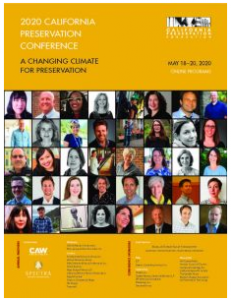 |
2020 Online Conference Details |
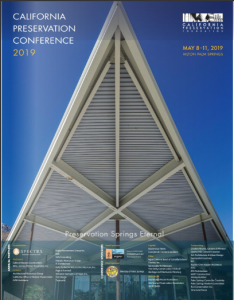 |
2019 Palm Springs Conference Details |
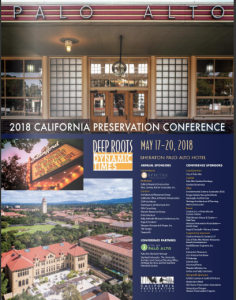 |
2018 Palo Alto Conference Details |

